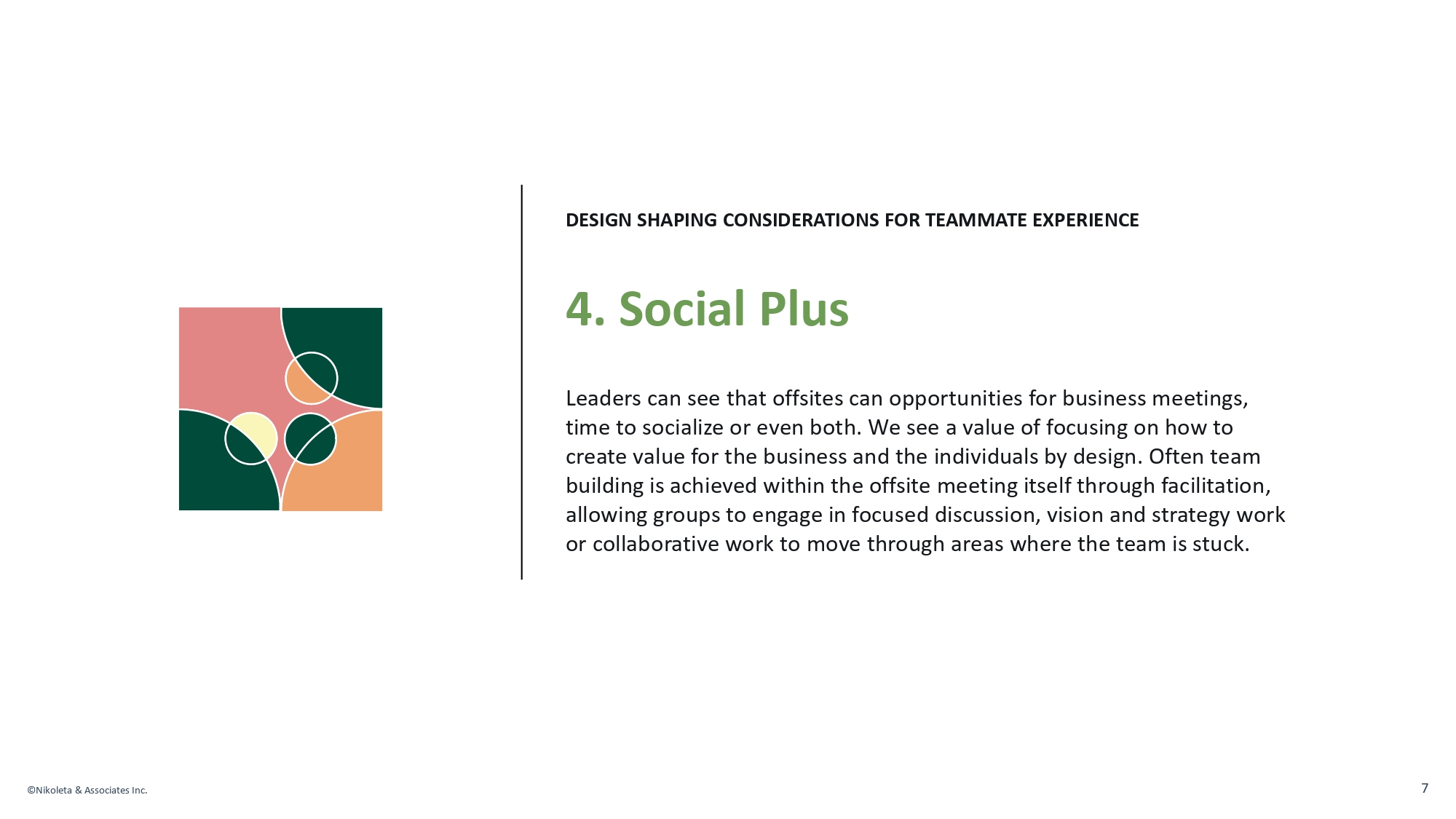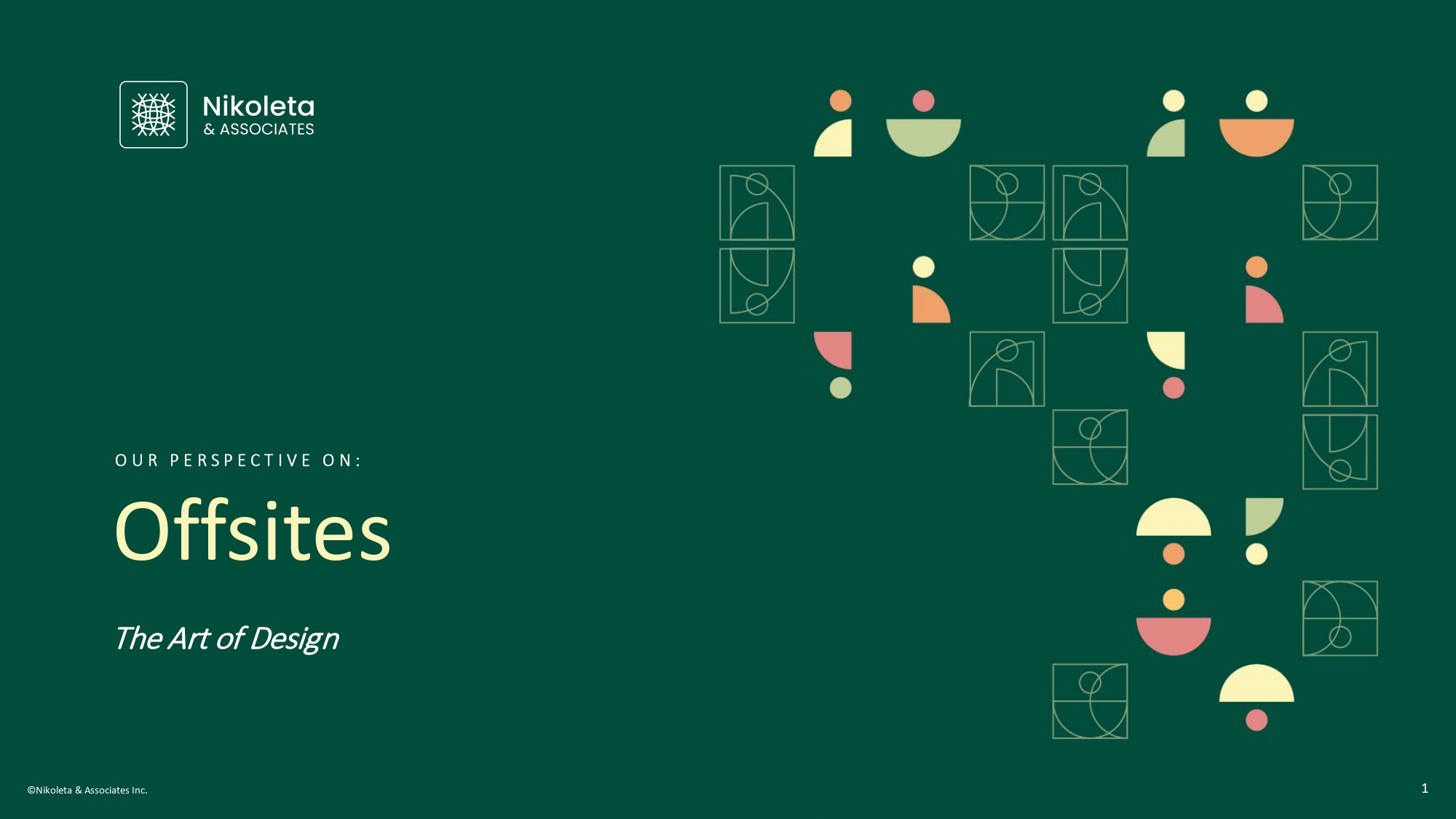Knowledge Kernel
Offsites


Organizational Events: How Do You Frame These?
In the ever-changing business landscape, we and our colleagues at Nikoleta & Associates often find it challenging to create a breathing space to consider the bigger picture, especially when our days are filled with task lists and diverse meetings. This becomes even more complex during periods of high growth and transformation.
When we sense the fast pace of numerous engagements, we see these moments as a cue to establish and re-establish a shared context. Beyond one-on-one check-ins and weekly huddles, we have seen the benefit of setting aside time for teams to discuss, share, and reflect on strategic topics pertinent to their organizational context.
Over the years, having designed and facilitated pre, during, and post offsite actions for ourselves and our clients, each event has increasingly affirmed the value of creating space. We view the creation of such spaces as an art, often likened to the work of organization architects or artists.
The Art of Design
We are frequently asked to share considerations for constructing a dynamic session flow and design, an approach we’ve seen directly impact the spatial environment and team experience.
Preparation Time is Thinking Time
We generally suggest pre-planning 90 days in advance of the offsite, providing enough time to gather design input from team members and assemble necessary materials. This timeline usually offers enough momentum without impacting daily priorities and tasks of those organizing.
Understand the ‘Why’
Another common pitfall we see is the attempt to cover as many topics as possible with a group. While we appreciate the value of collective leadership discussions, it’s crucial to intentionally select live discussion topics. Be cautious not to overload the review with too many concepts. Ask yourself: Given the group assembled, what would be beneficial to discuss at this point? Some topics may be better addressed in a different setting.
Organic Flow with Mindfulness
When crafting experiences, we advise being mindful of timing and over-scheduling. Excessive rigidity can stifle organic conversations and group dynamics. While structure is important, our approach for offsites is to set a direction, build shared understanding and context, but avoid overly rigid planning. This flexibility allows the group to adapt and reprioritize as needed.
Design Considerations Shaping Teammate Experience
Digest & Soak Time
A full day of sessions can be exhaustive, particularly with content-heavy topics. Whether including social lunches, dinners, or wrapping up early for team members to check in with others or call home, it’s essential to consider that offsites can be lengthy and intense, and people value and need breaks.
Before and After are Equally Important
Post-event follow-up is crucial as many ideas and objectives arise from these gatherings. We often design offsites with a post-event framework that is communicated to the team, encouraging ownership and accountability for tasks emerging from sessions.
Our goal is to sustain momentum by continuing communications and monitoring progress on key areas until the actions are integrated into teammates’ responsibilities. The impact of the meeting itself is unquestionable, but multiplying business value depends on the implementation of emerging ideas.
Consider a Trusted Third-party Facilitator
Including a trusted partner to facilitate allows leaders to focus more on live discussion rather than front-of-room responsibilities.
Social Plus
Offsites can serve as business meetings, socialization time, or both. We focus on creating value for the business and individuals by design. Often, team building happens within the offsite meeting itself through facilitation, allowing groups to engage in focused discussions, vision and strategy work, or collaborative work to navigate through challenges.
Lessons from COVID Times
Pre-COVID, in-person meetings were common practice, with face-to-face interaction deemed essential in business. We now know that in-person meetings aren’t always necessary for running a business, but there’s value in creating a collective space to discuss real-time priorities. As organizations contemplate ways of working in a post-COVID world, with virtual work and hybrid options, we resonate with the comfort and flexibility of remote work and the familial obligations, financial, and logistical issues associated with travel.
In our experience, offsites, or in-person group meetings, remain foundational to business. The importance of meeting up as a team, seeing each other, has never been more emphasized. Designing these meetings today, considering the lessons from COVID about how certain types of work are best done, offers different ingredients for our design process.















